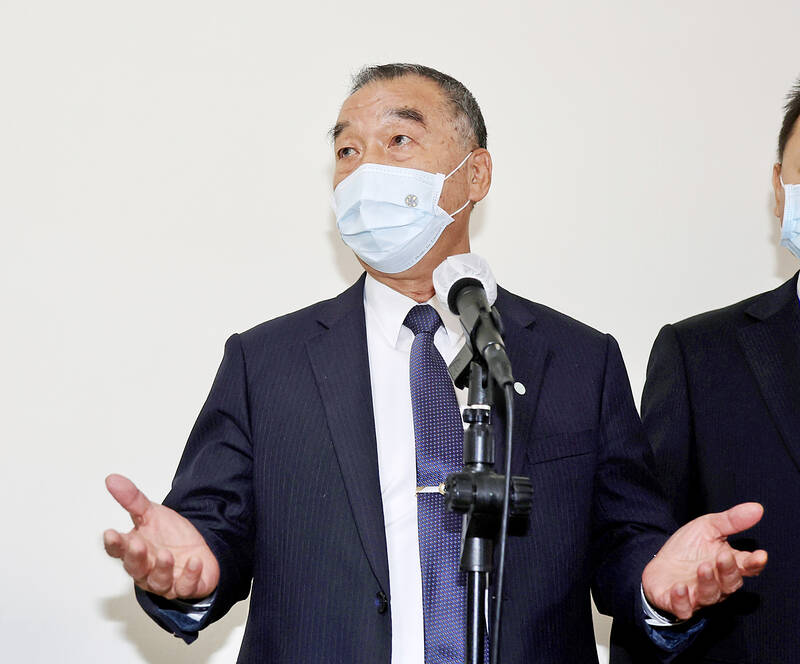The military would be prepared for war if it was forced to counter a “first strike” by the Chinese People’s Liberation Army (PLA), Minister of National Defense Chiu Kuo-cheng (邱國正) said yesterday at the legislature.
Chinese Nationalist Party (KMT) Legislator Chiang Chi-chen (江啟臣) asked Chiu to elaborate on a comment he made on Tuesday that incursions by the PLA’s uncrewed aerial vehicles (UAVs) into Taiwan’s territorial airspace would now be considered a “first strike,” necessitating countermeasures.
Chiang specifically asked what those countermeasures would be.

Photo: CNA
The military would first lock onto intruding UAVs as a warning, which if not heeded would prompt a defensive “counterattack,” Chiu said.
Asked by Chiang whether the counterattack would be aimed at repelling intruding PLA aircraft or preventing a “second strike,” Chiu said: “I don’t see it that way. After the first strike, we will be ready to respond to further attacks.”
Chiang asked whether launching a counterattack against a first strike would mean the two sides were “going to war.”
“Yes, in which case the situation would be very serious,” Chiu said. “This is why the military has been exercising self-restraint and does not pull the trigger recklessly.”
Chiu said during a legislative interpellation session on Wednesday last week that if the PLA flew aircraft into Taiwan’s territorial airspace it would be deemed a first strike, prompting the military to launch “countermeasures.”
On Tuesday, he said that in the past, a first strike was defined as an artillery attack, but since the Chinese Communist Party (CCP) has been changing its tactics by increasing the frequency of its drone incursions into Taiwan’s territorial airspace, causing “a lot of trouble,” such incursions would now also be defined as a first strike.

Taiwan yesterday condemned the recent increase in Chinese coast guard-escorted fishing vessels operating illegally in waters around the Pratas Islands (Dongsha Islands, 東沙群島) in the South China Sea. Unusually large groupings of Chinese fishing vessels began to appear around the islands on Feb. 15, when at least six motherships and 29 smaller boats were sighted, the Coast Guard Administration (CGA) said in a news release. While CGA vessels were dispatched to expel the Chinese boats, Chinese coast guard ships trespassed into Taiwan’s restricted waters and unsuccessfully attempted to interfere, the CGA said. Due to the provocation, the CGA initiated an operation to increase

CHANGING LANDSCAPE: Many of the part-time programs for educators were no longer needed, as many teachers obtain a graduate degree before joining the workforce, experts said Taiwanese universities this year canceled 86 programs, Ministry of Education data showed, with educators attributing the closures to the nation’s low birthrate as well as shifting trends. Fifty-three of the shuttered programs were part-time postgraduate degree programs, about 62 percent of the total, the most in the past five years, the data showed. National Taiwan Normal University (NTNU) discontinued the most part-time master’s programs, at 16: chemistry, life science, earth science, physics, fine arts, music, special education, health promotion and health education, educational psychology and counseling, education, design, Chinese as a second language, library and information sciences, mechatronics engineering, history, physical education

The Chinese military has boosted its capability to fight at a high tempo using the element of surprise and new technology, the Ministry of National Defense said in the Quadrennial Defense Review (QDR) published on Monday last week. The ministry highlighted Chinese People’s Liberation Army (PLA) developments showing significant changes in Beijing’s strategy for war on Taiwan. The PLA has made significant headway in building capabilities for all-weather, multi-domain intelligence, surveillance, operational control and a joint air-sea blockade against Taiwan’s lines of communication, it said. The PLA has also improved its capabilities in direct amphibious assault operations aimed at seizing strategically important beaches,

‘MALIGN PURPOSE’: Governments around the world conduct espionage operations, but China’s is different, as its ultimate goal is annexation, a think tank head said Taiwan is facing a growing existential threat from its own people spying for China, experts said, as the government seeks to toughen measures to stop Beijing’s infiltration efforts and deter Taiwanese turncoats. While Beijing and Taipei have been spying on each other for years, experts said that espionage posed a bigger threat to Taiwan due to the risk of a Chinese attack. Taiwan’s intelligence agency said China used “diverse channels and tactics” to infiltrate the nation’s military, government agencies and pro-China organizations. The main targets were retired and active members of the military, persuaded by money, blackmail or pro-China ideology to steal